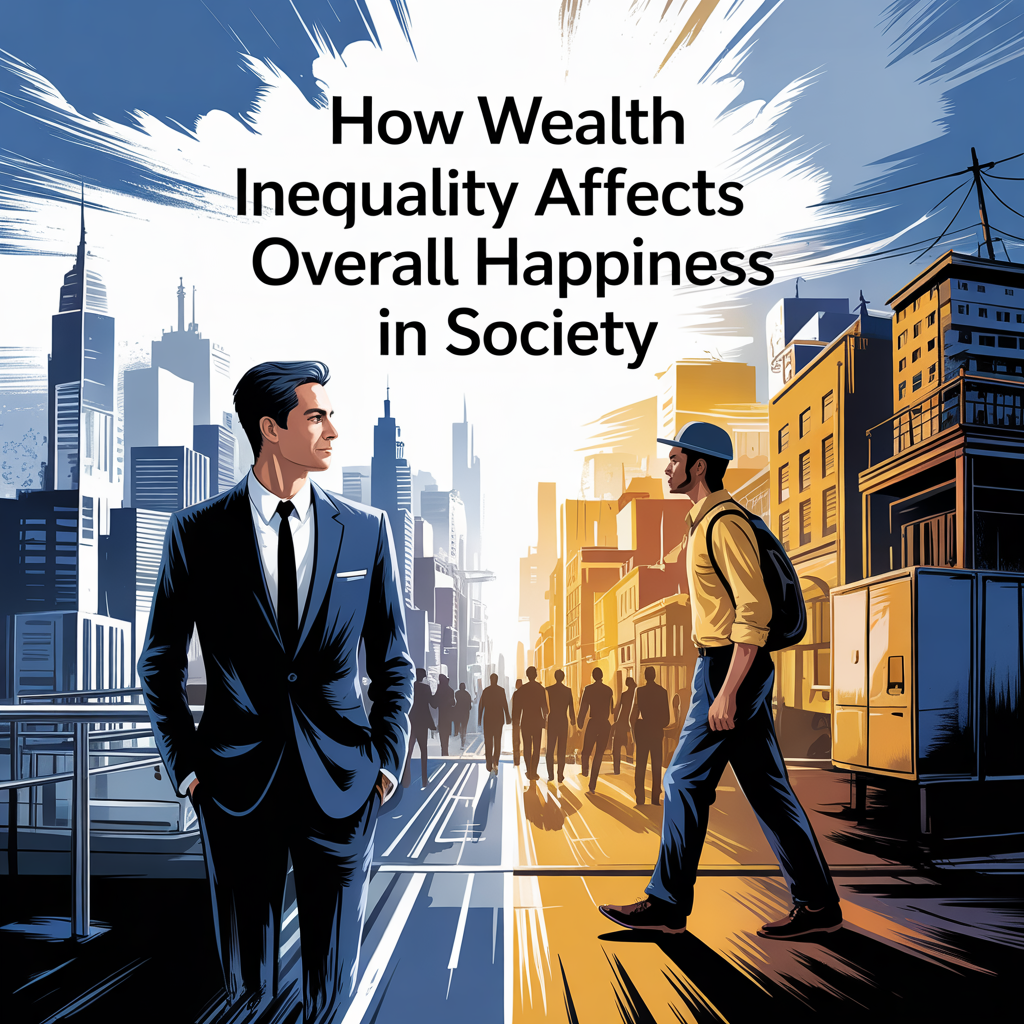How Wealth Inequality Affects Overall Happiness in Society
Wealth inequality and happiness share a complex relationship that shapes our communities in profound ways.
The stark contrast between those who have abundance and those who struggle affects everyone’s sense of contentment.
Research consistently shows that societies with less extreme economic disparities tend to report higher collective satisfaction.
This connection goes beyond simple economics and touches on our fundamental human needs for fairness and opportunity.
When resources are distributed more evenly, people feel a greater sense of belonging and trust within their communities.
Citizens in more equal societies often experience less stress related to status competition and financial insecurity.
The psychological impact of living in a highly unequal society can manifest as decreased mental health even among the wealthy.
Understanding these dynamics requires examining both objective measures and subjective experiences across different populations.
We strongly recommend that you check out our guide on how to take advantage of AI in today’s passive income economy.
Table of Contents
The Psychological Impact of Economic Disparity
Wealth inequality and happiness correlate inversely in numerous scientific studies examining population-wide satisfaction metrics.
People living in environments with visible economic gaps often report higher levels of anxiety regardless of their personal wealth.
The human brain naturally makes social comparisons, which can trigger feelings of inadequacy when differences appear extreme.
Children growing up in highly unequal communities may develop different expectations about their potential life outcomes.
When individuals perceive the economic system as fundamentally unfair, they typically express lower overall life satisfaction.
This perception of injustice can erode social trust, a critical component for community happiness and cooperation.
Research in neuroscience reveals that witnessing extreme inequality activates brain regions associated with negative emotions.
These reactions occur subconsciously and affect daily mood even when people aren’t actively thinking about economic issues.
Status Anxiety in Unequal Societies
The pressure to maintain appearances grows more intense as wealth inequality increases across neighborhoods and social groups.
People spend more resources on status symbols when economic differences become more pronounced, often sacrificing genuine needs.
This phenomenon, known as “status anxiety,” diverts money from experiences that research shows actually improve happiness levels.
Financial inequality creates an environment where visible consumption becomes a language for communicating social position.
Even wealthy individuals report feeling inadequate when surrounded by those with significantly more resources or privileges.
The psychological burden of constantly comparing oneself to others drains cognitive resources that could enhance well-being.
Communities with less wealth inequality typically demonstrate more authentic relationships less focused on material indicators.
These societies often prioritize collective experiences that foster genuine connection rather than competitive consumption.
Impact on Physical Health
The stress induced by living in highly unequal societies manifests physically through measurable health disparities.
Research consistently links greater wealth inequality with higher rates of chronic health conditions across all income levels.
When financial resources determine access to healthcare, preventative care often becomes a luxury rather than a standard.
The physical toll of economic insecurity includes elevated cortisol levels, disrupted sleep patterns, and compromised immunity.
Communities with substantial economic gaps show higher rates of stress-related conditions like heart disease and hypertension.
These health impacts create a cycle where physical wellbeing and economic opportunity become increasingly interconnected.
Interestingly, the negative health effects of wealth inequality appear even in individuals who personally have adequate resources.
This suggests that the social environment created by economic disparity affects everyone, not just those experiencing poverty.
Social Cohesion and Community Trust
Societies with extreme wealth inequality tend to experience fragmentation in community structures and public interactions.
People naturally segregate along economic lines, reducing opportunities for diverse social connections that foster understanding.
When different economic classes rarely interact, stereotypes and misconceptions flourish, further dividing communities.
This social separation diminishes the shared experiences that typically form the foundation of collective identity and purpose.
Countries with lower wealth inequality report stronger feelings of social solidarity and higher levels of interpersonal trust.
These measures of social cohesion correlate directly with reported happiness levels in comprehensive international studies.
Trust in institutions also tends to erode as economic disparity increases, further undermining societal happiness.
When citizens believe the system works fairly for everyone, they experience greater satisfaction with their collective life.
The Role of Public Spaces
Communities with less wealth inequality typically invest more in shared resources that benefit collective societal happiness.
Public parks, libraries, and community centers create environments where people from different backgrounds can meaningfully connect.
These spaces serve as equalizers, offering similar experiences regardless of individual economic circumstances.
In societies with extreme financial inequality, public infrastructure often deteriorates as wealthy citizens opt for private alternatives.
This withdrawal from shared resources creates visibly different experiences based solely on economic status.
Children growing up in such divided environments develop different expectations about cooperation and community responsibility.
Research shows that happiness levels increase when people have access to quality public spaces regardless of their income.
The visible investment in common good signals a societal commitment to wellbeing that transcends individual wealth accumulation.
Trust in Democratic Processes
Political engagement suffers significantly in societies marked by extreme wealth inequality and disparate economic opportunities.
Citizens in highly unequal societies often perceive political systems as captured by wealthy interests rather than representing everyone.
This perception diminishes belief in democratic processes and reduces the happiness that comes from civic participation.
When people feel their voices matter equally regardless of economic status, they report greater satisfaction with governance.
Social well-being improves in political systems where economic power doesn’t translate directly into disproportionate influence.
Studies show wealth inequality directly impacts voter turnout, with greater disparities correlating with lower participation.
The resulting governance often fails to address the needs of diverse populations, further exacerbating happiness disparities.
This creates a concerning cycle where economic inequality reinforces political inequality, which then deepens economic divides.
Economic Mobility and Hope
Societies with less wealth inequality typically offer more pathways for economic advancement across all social classes.
The belief that hard work will lead to improved circumstances powerfully influences happiness regardless of current conditions.
When people perceive economic barriers as insurmountable, they experience diminished hope and decreased overall life satisfaction.
Children particularly suffer when they sense limited opportunities, developing narrower visions of their possible futures.
Research demonstrates that perceived economic mobility affects happiness more significantly than absolute wealth measures.
Financial inequality becomes especially damaging when combined with rigid class structures that prevent social movement.
Communities that maintain multiple pathways to success foster resilience even among those currently experiencing economic challenges.
This hope for future improvement serves as a psychological buffer against the negative effects of present inequality.
Entrepreneurship and Innovation
Extreme wealth inequality can stifle the creative potential of significant portions of the population who lack access to resources.
When entrepreneurial opportunities remain concentrated among those with existing wealth, societies lose diverse perspectives and solutions.
The resulting innovation gap limits economic growth that could otherwise improve happiness levels across economic spectrums.
Societies with moderate wealth inequality typically demonstrate more widespread innovation and small business development.
These communities benefit from diverse problem-solving approaches drawn from varied life experiences and perspectives.
The psychological freedom to take calculated risks diminishes when financial inequality creates extreme consequences for failure.
Research shows that happiness increases when individuals can express creativity and autonomy through meaningful work.
Broader access to entrepreneurial opportunities creates multiple pathways to satisfaction beyond traditional employment.
Education and Skill Development
Access to quality education becomes increasingly stratified in societies with pronounced wealth inequality and restricted mobility.
Children from economically disadvantaged backgrounds often attend schools with fewer resources and less experienced teachers.
This educational inequality perpetuates economic disparities across generations, limiting long-term societal happiness.
When access to skill development depends primarily on existing wealth, communities lose valuable human potential.
Countries with more equitable educational systems consistently report higher average happiness scores in global surveys.
The knowledge that opportunities exist for all children creates community-wide optimism that enhances current satisfaction.
Financial inequality becomes particularly damaging when it creates visibly different educational experiences for children.
These early disparities shape lifelong expectations about fairness and opportunity that influence happiness well into adulthood.
Consumption Patterns and Satisfaction
Societies with extreme wealth inequality often develop consumption cultures focused on positional goods rather than experiences.
Research consistently shows that spending on experiences rather than possessions creates more lasting improvements in happiness levels.
When social status depends heavily on visible consumption, people make purchasing decisions that provide less genuine satisfaction.
This pattern particularly affects middle-income groups who spend disproportionately on status signals to avoid appearing disadvantaged.
Communities with less financial inequality typically demonstrate consumption patterns more closely aligned with research on happiness.
These societies focus more on leisure time, relationship-building activities, and experiences rather than positional purchases.
Wealth inequality indirectly shapes cultural values around consumption that influence everyone’s decision-making processes.
The resulting misallocation of resources toward status rather than wellbeing reduces happiness across economic classes.
Leisure and Work-Life Balance
Societies with pronounced economic disparity often develop workplace cultures that glorify overwork and continuous productivity.
This emphasis on work as the primary measure of worth diminishes time available for relationships and experiences that foster happiness.
Countries with less wealth inequality typically protect leisure time through policies like guaranteed vacation and reasonable work hours.
These protections allow citizens across economic spectrums to engage in activities proven to enhance psychological wellbeing.
Financial inequality becomes particularly harmful when it creates drastically different work expectations based on economic class.
When some must work multiple jobs while others enjoy abundant free time, the resulting contrast heightens awareness of disparity.
Research demonstrates that adequate leisure time contributes significantly to happiness regardless of absolute wealth measures.
The ability to engage in meaningful rest and recreation appears universal in its positive impact on life satisfaction.
Housing and Neighborhood Effects
Housing segregation intensifies as wealth inequality increases, creating visibly different living environments based on economic status.
This physical separation reinforces social divisions and limits the community connections that contribute to collective happiness.
People living in economically homogeneous neighborhoods develop different perceptions about societal fairness and opportunity.
When housing quality varies dramatically within communities, it creates constant visible reminders of economic disparity.
Societies with less wealth inequality typically demonstrate more mixed-income neighborhoods with shared amenities and experiences.
These integrated communities foster greater empathy and understanding across economic differences, enhancing societal happiness.
Research links housing stability directly to measures of life satisfaction across different cultures and economic systems.
The security of adequate housing provides a foundation for other happiness-promoting activities and relationships.
Policy Approaches to Inequality and Happiness
Governments increasingly recognize the connection between wealth inequality and happiness when designing economic policies.
Progressive taxation systems that moderate extreme wealth concentration appear in countries with higher average happiness scores.
Robust social safety nets reduce the anxiety associated with potential economic hardship across all income levels.
When basic needs remain secure regardless of market fluctuations, people report higher satisfaction even during challenging times.
Financial inequality becomes less damaging to happiness when coupled with universal access to essential services like healthcare.
Countries implementing universal basic income experiments report interesting preliminary effects on wellbeing and community engagement.
Research suggests that policies reducing wealth inequality may create economic benefits beyond the direct impact on happiness levels.
These approaches recognize that societal happiness represents a valuable public good worth considering in policy decisions.
Corporate Responsibility and Wage Structures
Companies increasingly examine how their compensation structures affect overall employee happiness and productivity.
Organizations with smaller gaps between highest and lowest paid employees often report better team cohesion and satisfaction.
When workers perceive wage structures as fundamentally fair, they demonstrate greater commitment and workplace happiness.
This organizational microcosm reflects broader societal patterns connecting wealth inequality to collective wellbeing.
Businesses experimenting with more equitable profit-sharing models report interesting effects on innovation and collaboration.
These approaches recognize that extreme inequality within organizations creates similar psychological effects as societal disparity.
Research links compressed wage scales with higher productivity and reduced turnover in diverse economic sectors.
Forward-thinking companies increasingly consider happiness metrics alongside traditional performance measures when evaluating policies.
Community-Based Solutions
Local communities develop innovative approaches to address wealth inequality when national policies prove insufficient.
These grassroots initiatives often focus on building alternative economic structures that distribute benefits more equitably.
Community land trusts, cooperative businesses, and time banking systems create local economies less prone to extreme disparities.
When people directly participate in creating more balanced systems, they report increased satisfaction beyond economic benefits.
Financial inequality feels less threatening when communities maintain strong social bonds across economic differences.
These local approaches often serve as laboratories for broader policy approaches to enhancing societal happiness.
Research shows that community-level interventions can significantly buffer the negative effects of national economic trends.
The resulting social capital provides psychological resources that enhance resilience during economic challenges.
Conclusion: Toward Balanced Prosperity
Wealth inequality and happiness research offers important insights for creating societies where wellbeing flourishes broadly.
The evidence consistently suggests that extreme economic disparities undermine the social foundations necessary for collective satisfaction.
Finding balanced approaches that encourage innovation while preventing harmful concentration of resources remains an ongoing challenge.
Communities that successfully navigate this balance typically report higher levels of trust, health, and overall life satisfaction.
Economic systems ultimately exist to serve human flourishing rather than abstract metrics disconnected from lived experience.
Recognizing the profound connection between distribution patterns and happiness opens new possibilities for policy and community design.
Individual choices about consumption, investment, and civic engagement collectively shape the environment we all experience.
By understanding how wealth inequality affects our shared happiness, we can work toward economies that truly enhance human wellbeing.

We strongly recommend that you check out our guide on how to take advantage of AI in today’s passive income economy.




